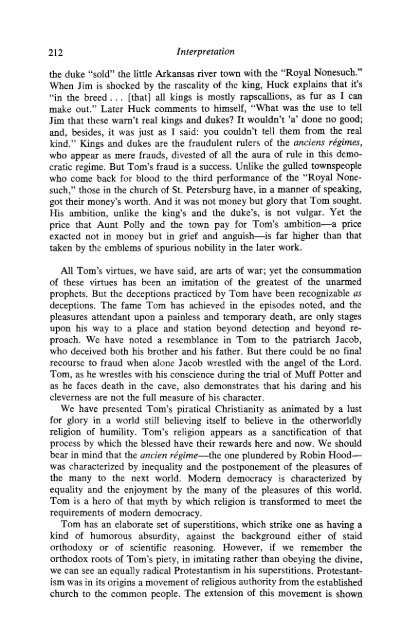Interpretation: A Journal of Political Philosophy
Interpretation: A Journal of Political Philosophy
Interpretation: A Journal of Political Philosophy
Create successful ePaper yourself
Turn your PDF publications into a flip-book with our unique Google optimized e-Paper software.
212<br />
<strong>Interpretation</strong><br />
the duke "sold"<br />
the httle Arkansas river town with the "Royal Nonesuch."<br />
When Jim is shocked by the rascality <strong>of</strong> the king, Huck explains that it's<br />
"in the breed .<br />
make<br />
out."<br />
. . [that] aU kings is mostly rapscallions, as fur as I can<br />
Later Huck comments to himself, "What was the use to teU<br />
done no good;<br />
Jim that these warn't real kings and dukes? It wouldn't 'a'<br />
and, besides, it was just as I said: you couldn't tell them from the real<br />
kind."<br />
Kings and dukes are the fraudulent rulers <strong>of</strong> the anciens regimes,<br />
who appear as mere frauds, divested <strong>of</strong> all the aura <strong>of</strong> rule in this demo<br />
cratic regime. But Tom's fraud is a success. Unhke the guUed townspeople<br />
who come back for blood to the third performance <strong>of</strong> the "Royal None<br />
such,"<br />
those in the church <strong>of</strong> St. Petersburg have, in a manner <strong>of</strong> speaking,<br />
got their money's worth. And it was not money but glory that Tom sought.<br />
His ambition, unlike the king's and the duke's, is not vulgar. Yet the<br />
price that Aunt PoUy and the town pay<br />
for Tom's ambition a price<br />
exacted not in money but in grief and anguish is far higher than that<br />
taken by the emblems <strong>of</strong> spurious nobility in the later work.<br />
All Tom's virtues, we have said, are arts <strong>of</strong> war; yet the consummation<br />
<strong>of</strong> these virtues has been an imitation <strong>of</strong> the greatest <strong>of</strong> the unarmed<br />
prophets. But the deceptions practiced by Tom have been recognizable as<br />
deceptions. The fame Tom has achieved in the episodes noted, and the<br />
pleasures attendant upon a painless and temporary death, are only stages<br />
upon his way to a place and station beyond detection and beyond re<br />
proach. We have noted a resemblance in Tom to the patriarch Jacob,<br />
who deceived both his brother and his father. But there could be no final<br />
recourse to fraud when alone Jacob wrestled with the angel <strong>of</strong> the Lord.<br />
Tom, as he wrestles with his conscience during the trial <strong>of</strong> Muff Potter and<br />
as he faces death in the cave, also demonstrates that his daring and his<br />
cleverness are not the full measure <strong>of</strong> his character.<br />
We have presented Tom's piratical Christianity as animated by<br />
a lust<br />
for glory in a world still believing itself to believe in the otherworldly<br />
religion <strong>of</strong> humUity. Tom's religion appears as a sanctification <strong>of</strong> that<br />
process by<br />
bear in mind that the ancien regime the one plundered by Robin Hood<br />
which the blessed have their rewards here and now. We should<br />
was characterized by inequality and the postponement <strong>of</strong> the pleasures <strong>of</strong><br />
the many to the next world. Modern democracy is characterized by<br />
equality and the enjoyment by the many <strong>of</strong> the pleasures <strong>of</strong> this world.<br />
Tom is a hero <strong>of</strong> that myth by which rehgion is transformed to meet the<br />
requirements <strong>of</strong> modern democracy.<br />
Tom has an elaborate set <strong>of</strong> superstitions, which strike one as having a<br />
kind <strong>of</strong> humorous absurdity,<br />
against the background either <strong>of</strong> staid<br />
orthodoxy or <strong>of</strong> scientific reasoning. However, if we remember the<br />
orthodox roots <strong>of</strong> Tom's piety, in imitating rather than obeying the divine,<br />
we can see an equally radical Protestantism in his superstitions. Protestant<br />
ism was in its origins a movement <strong>of</strong> religious authority from the established<br />
church to the common people. The extension <strong>of</strong> this movement is shown

















